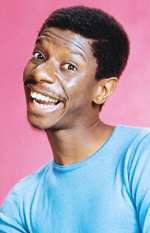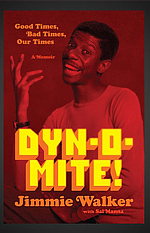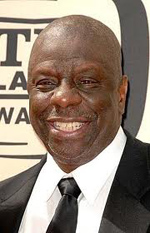


Jimmie Walker entered a new phase of his professional career with the publication of his first book, DYN-O-MITE!: GOOD TIMES, BAD TIMES, OUR TIMES–A MEMOIR (Da Capo Press, 2012). His book tour included personal appearances on multiple top television shows including “Letterman”, “Today”, “Wendy Williams” and CNN’s “Starting Point”.
In his programs, Jimmie offers a combination of stand-up and lecture (sponsor decides the ratio), while commenting on all kinds of events that have occurred over the past 40 years (including what’s happening right now).
Jimmie’s personal and professional biography is a fascinating tale. Rising from the streets of New York's ghettos to television superstardom, Jimmie Walker personifies the great American success story. His catch phrase "Dyn-o-mite!" is part of the modern vernacular, and he became such a major celebrity in the 1970's that Time Magazine named him "Comedian of the Decade.”
Walker was born on June 25th, 1947, on the mean streets of New York's South Bronx. At the time it was a poverty-ridden area notorious for its burned-out buildings, graffiti and crime, but to a very young boy, it was nothing more than "the neighborhood." Jimmie didn't grow up with thoughts of performing as a potential occupation. His life in the Projects centered around the basketball courts and ignoring school. Basketball was his first love, but at age fifteen, Jimmie only carried 129 pounds on his six foot frame, and the NBA wasn't calling.
He left high school before graduating and joined the workforce, holding a number of odd jobs, including working as a vendor at Yankee Stadium. Walker eventually landed a delivery job at the Grand Union Market at a salary of $47 per week - before taxes. Even though he was working all day, Jimmie wanted to continue his education, so he made an arrangement with his boss to end his shift a little early and attend Theodore Roosevelt High School at night. He entered into the federally funded SEEK program, short for Search for Education, Evaluation and Knowledge, which accepted students who needed an educational "half-way house" as they climbed the educational ladder. His studies at SEEK focused on mathematics and literature. At age 19, Walker had some catching up to do with his grammar lessons, but his writing skills became stronger when he began writing for a class in Oral Interpretation—and along the way, he discovered he was funny. When he delivered one piece he'd penned to his SEEK classmates, they howled! When asked by one appreciative teenager, "Are you a comedian?", Walker answered, "I guess I am." And with that, the first seeds were sown for Jimmie Walker's comedic career.
Upon completion of the SEEK program, Jimmie began to learn about the world of radio at the RCA Technical Institute. He started as an engineer, which required a first-class license that was available only through hours of study and by passing a test. Within a year he had earned his first-class ticket to the future. Jimmie walked into a small local radio station, WRVR, and was immediately hired as a part-time engineer at a salary of $100 per week.
In 1967, he improved his "day job" by moving up to WMCA radio for $250 a week, but performing comedy was still something he wanted to try. A mutual friend introduced him to The Last Poets, a group dedicated to performing militant poetry. They needed an opening act and after a successful audition, Walker opened for the Poets at the East Wind in Harlem on New Year's Eve. He did five minutes of standup, floored the crowd of 350, and stayed with the Poets for 18 months while he built his act and gained confidence as a performer. By 1969, Jimmie was on stage at the African Room in Manhattan along with a few other up-and-coming talents, including Bette Midler, David Brenner and Steve Landesberg. Brenner was the first to get his big break and then helped Walker and the others, moving them all to Budd Friedman's Improv in New York where they occasionally got some valuable stage time. Brenner and his "disciples" soon turned into crowd favorites and became regulars onstage. To top it all off, Walker spent a year as the youngest MC in the history of the world at the famous Apollo Theater in Harlem.
In those early days, doing "The Tonight Show" was a direct line to the Big Time. Brenner made it first, followed by Landesberg, Midler and Freddie Prinze, but Jimmie still hadn't landed that "big break." Then Brenner, Landesberg and Midler, scheduled for the powerhouse "Jack Paar Show" on ABC, refused to appear unless Walker was also given a spot. The Paar staff gave in, and were glad they did. Jimmie's first guest shot was successful beyond anyone's expectations. Dan Rowan, who had seen the show, immediately flew Jimmie to Los Angeles to guest on a "Laugh In" special. That was followed by a second guest spot on "Jack Paar", and a contract with CBS to perform each week as the audience warm-up for the sitcom "Carlucci's Department."
The series of successes gave Walker the confidence to give up his day job, and by the early 1970s, he was working as the main attraction in all the top comedy clubs. His soaring popularity prompted Time Magazine to name him "Comedian of the Decade".
Spotted by the casting director for Norman Lear of "All in the Family" fame, Jimmie accepted a part in Lear's new urban-styled comedy series, "Good Times." The role of the broadly strutting, wisecracking J.J. Evans would launch him into television superstardom. "Dyn-o-mite!" was the phrase that made him famous nationwide. As "Good Times" enjoyed a six year run, Walker's fame grew exponentially. He was the first winner of the NAACP Image Award, and won a Golden Globe nomination for Best Supporting Actor in a Comedy Series. He appeared on The Mac Davis Show, Donny and Marie, The John Davidson Show, The Merv Griffin Show, Dinah, The Mike Douglas Show, The Hollywood Squares, and the Match Game. Clothing, tee-shirts and even a talking doll that blurted out his signature catch phrase were soon on store shelves everywhere.
Even with his demanding schedule, Jimmie continued to appear as the headliner at top comedy clubs, including the world famous Comedy Store in Los Angeles. His joke writing team included a young David Letterman, Jay Leno and Byron Allen.
Walker's television work would lead to movie roles, like boxer Bootney Farnsworth in "Let's Do it Again," co-starring with entertainment luminaries Sidney Poitier and Bill Cosby. Jimmie also released a smash comedy album, "Dyn-o-mite!" that went gold. When "Good Times" ended in 1979, Aaron Spelling offered Walker a starring role in the short-lived "B.A.D. Cats" and returned to cast him again in 1983 in "At Ease", an ABC series about a bunch of United States Army misfits. He also landed choice roles in films like "Airplane!" and "Airport '79", and was a regular on television shows like "The Love Boat" and "Fantasy Island". In recent years he's made scene-stealing appearances on "The George Lopez Show", "Everybody Hates Chris" with Chris Rock, and "Scrubs".
But despite all Jimmie's success on the big and small screens, stand-up comedy remains his first love. Walker currently tours the country 35 weeks a year performing live, and guesting on game shows and late night television. In his spare time he writes scripts for TV and movies, and continues to enjoy a comedy career now approaching five decades.
GREAT AMERICAN COMEDY FESTIVAL
–JOHNNY CARSON LEGEND AWARD
Norfolk (NE) Daily News-June 18, 2012
Jimmie “J.J.” Walker --who rose to fame in the 1970s and ’80s as a television actor and comedian--appeared in Norfolk (NE) on Saturday, June 16, 2012 to receive the Viaero Great American Comedy Festival’s annual Johnny Carson Comedy Legend award.
He joined previous recipients Dick Cavett, Bill Dana, Ed Asner and Cloris Leachman. But not only did he receive the award, he also took to the stage of the Johnny Carson Theatre and performed some of the stand-up comedy that helped make him famous.
“We were thrilled to have Jimmie with us and be able to present him with our Johnny Carson Comedy Legend Award,” said Lori Williams, the festival’s executive director. “It was a great evening.”
Walker joined host Paula Poundstone and the finalists of the festival’s stand-up competition in the Saturday evening performance.
BOOK REVIEWS OF
DYN-O-MITE!: GOOD TIMES, BAD TIMES,
OUR TIMES--A MEMOIR
KIRKUS REVIEWS-APRIL 15, 2012
A fast, funny and informative stand-up routine/memoir from one of the major comic stars of the 1970s.
Walker–who made his name as J.J. Evans on the sitcom, “Good Times”–recounts his life in the ghetto, on TV and on the road. He gives a good inside look at the TV show, where he was cast as the teenage J.J., surprising producers and angering the cast by becoming the breakout star. At the peak of his fame, he would also play a supporting role in the careers of both David Letterman and Jay Leno, two of the many struggling unknown comics who wrote jokes for him. He also had a front-row seat to the decades-long friendship-turned-bitter-rivalry that would lead to the late-show wars of the early 1990s; long after the dust has settled, he remains strongly Team Letterman, holding Leno in contempt. As for the rest of the competition, he admired Richard Pryor, had limited patience for Andy Kaufman and thinks Cosby is king. (He also admits he isn’t always the best judge, having once advised Steve Martin to find another career.) Walker also acknowledges certain limits that come with his choice of career: “The problem is that white comics don’t have to be white, but black comics have to be black.” Other limits are self-imposed; although uninhibited in his lifestyle, this self-proclaimed, “Johnny Mathis of Black Comedians, ” has long adhered to his friend David Brenner’s advice that you can’t be successful if you can’t work clean. He is similarly conservative in his politics. Walker, once the comic relief for Black Panther rallies, takes a little too much delight in being a “black sheep among black people.”
Rants aside, a unique perspective on the perils of modern comedy from a survivor with a long memory.
PUBLISHERS WEEKLY–MAY 21, 2012
Comedian and actor Walker delivers a solid, thoughtful, and provocative memoir about his nearly four decade-long career–which should surprise almost anyone who first discovered Walker as J.J. on the hit 1970s television show, “Good Times.” As the “always-getting-into-trouble” 17 year-old son in a “lower-class, urban black family dealing with the world”, Walker improvised an exclamation–“Dyn-o- mite!”–that became his character’s trademark catchphrase as well as entering the American lexicon. “Little did I realize at the time how one world could change your lifer,” Walker wryly notes, since he had been working in New York City during the 1960s honing his standup craft on a range of stages (Walker once opened for jazz legend, Miles Davis) alongside stars such as Robert Klein and David Brenner as well as future superstars including Richard Lewis and Jerry Seinfeld. While Walker does an excellent job showing how much of what has been written negatively about “Good Times” has been “revisionist history” (i.e., for nine of the last ten episodes, J.J. never said “dyn-o-mite”), the best parts of his memoir deal with his early days, his post “Good Times” career (“I was surprised as anyone that my character became
the breakout star”), his insider involvement in the Jay Leno–David Letterman feud, and his many perceptive observations about comedy and current influential comedians such as Chris Rock: “He works hard, is aware of all aspects of life, and knows not only comedy but the history of comedy.”
THE HOLLYWOOD REPORTER-JUNE 20, 2012
by Andy Lewis (Excerpts)
Jimmie Walker, the comedian who skyrocketed to fame playing J.J. Evans on the CBS sitcom , “Good Times” (1974-79), has written DYN-O-MITE: GOOD TIMES, BAD TIMES, OUR TIMES–A MEMOIR.
In addition to talking about his time on the Norman Lear-penned show and his recent notoriety as an outspoken African-American conservative, Walker spills about the '70s stand-up comedy scene and his friendship with future stars like David Letterman, Jay Leno and Freddie Prinze.
Here are three surprising revelations about that period from Walker’s book.
1. When Walker played Boston he crashed at Leno’s apartment nicknamed “Leno Arms.”
Leno was from Boston and when young comics like Walker were in the city for a club gig he would let them stay at his apartment. Nicknamed “Leno Arms,” it consisted of nothing more than mattresses on the floor, but Leno’s mom would regularly come by to clean the apartment for him.
2. Dave Letterman was squeamish about sex jokes.
After “Good Times” became a hit, Walker hired many of his struggling friends as joke writers, including Dave Letterman, who he paid $150 a week. Letterman told Walker that he couldn’t write jokes for black comedians but Walker claims it was sex jokes that Letterman really had trouble writing.
He recounts numerous “black” jokes Letterman wrote, including this one: “I used to be real interested in camping. I’d find out when ya’ll were away on a camping trip, then I’d come over and do a little shopping.”
But he can only recall one sex joke: “The University of Washington conducted a study that proved girls with big chests get more rides when hitchhiking than flat-chested girls. Used to be all you needed was a thumb. Now you’ve got to have two handfuls.”
3. Walker blames Jay Leno for ruining the career of his friend and fellow comic Steve Crantz.
In the early 70s, Crantz was part of Walker’s circle of joke writers that included Letterman and Leno. Walker describe him as one of the most prolific and gifted comedians he ever met. But he hated living in Los Angeles and soon moved back home to Pittsburgh. Ten years later, when he wanted to try again Walker and manager Jerry Kushnick convinced a reluctant Leno to hire Crantz as a joke writer for his regular
appearances as Johnny Carson’s substitute on “The Tonight Show”. Leno refused to use any of his jokes, once even refusing to pay Crantz $50 for a joke he used on air, claiming someone else wrote it. Heartbroken, Crantz soon returned to Pittsburgh, where he died of cancer three years later. Walker calls Leno’s treatment of Crantz “unforgivable.”
Reprinted with permission.